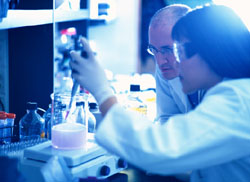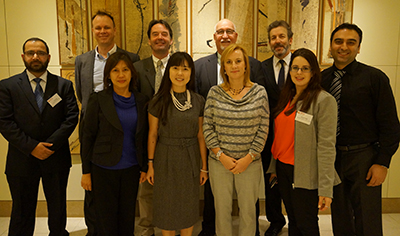Scientists launch research-to-business development initiative: Science Next Collaborative
KEY Australian scientists have joined the Science Next Collaborative (SNC) to help speed up the process of commercialising promising research through new business links.
Founded by Sigma-Aldrich, the Science Next Collaborative is bringing together leading Australian scientists to facilitate an exchange of knowledge, ideas, educational tools and best practice pathways. The initiative is aiming to especially assist early-to-mid-career researchers (EMCRs) to help bridge the gap from basic and promising research discovery to translational research and its commercialisation. 
“A thorough examination of the Australian scientific research sector uncovered that many researchers are struggling to achieve the final steps in their research continuum: successful commercialisation,” Sigma Aldrich Oceania marketing director for shared services, Reich Webber-Montenegro said.
“This gap is even more real amongst early-to-mid-career researchers, and this may discourage them from continually pursuing meaningful and ongoing scientific endeavours. If this risk becomes a reality, Australia may see a huge dip in the innovation ecosystem and associated returns generated by a dynamic research industry.”
Associate Professor Derek Richard, who is the director of research for the School of Biomedical Sciences at Queensland University of Technology (QUT) and an SNC Think Tank member, highlighted the importance of the initiative.
“Australia has a world-class reputation for scientific research outputs,” Assoc. Prof Richard said.
“We produce 3 percent of the world’s research whilst representing only 0.3 percent of the population,” he said, quoting from the July 2012 report, Shaping Up: Trends and Statistics in Funding Health and Medical Research.
“However there seems to be additional challenges for today’s young researchers. University enrolments in science and the number of PhD students are stalling, which has led to industry-wide concern for Australia’s standing as a science and research powerhouse,” Assoc. Prof. Richard said.
“It’s usually difficult for young researchers to take their discoveries through to commercialisation, possibly due to a lack of experience in intellectual property protection, market research, lodging patents and gaining working capital, which are all fundamental elements in the commercialisation of research.”
University of Adelaide professor and SNC Think Tank member, Prof. Deborah White, who is also the director for cancer research at SAHMRI, spoke on behalf of the seven other Think Tank members participating in the initiative.
“We have a collective experience navigating the commercialisation journey and we share a strong appetite to help the next generation of leading Australian innovators,” Prof. White said.
“In joining the Science Next Collaborative, we are committing to establishing a framework that can provide genuine commercialisation pathways.”
The SNC Think Tank is a panel of seven leading Australian scientists who will debate the question: “how do we better enable Australian scientists, especially EMCRs, to successfully translate their research through to commercialisation?”
Also on the SNC Think Tank with Prof. White and Assoc. Prof Richard are Australian National University School of Chemistry research director, Prof. John Carver; Monash University deputy director of the Australian Regenerative Medicine Institute, Prof. Peter Currie; Macquarie University Department of Biomedical Sciences professor of Proteomics and Biochemistry and president of the Human Proteome Organisation, Prof. Mark Baker; University of Sydney School of Molecular Bioscience Professor David James; and Assoc. Prof. Kaylene Simpson, head of the Victorian Centre for Functional Genomics at the Peter MacCallum Cancer Centre.
A publishable positioning paper will capture the current situation, key challenges and ways to better enable scientists to secure economic returns for their research. Educational resources will also be offered, including a series of forums and the launch of a dedicated online hub.
The Science Next Collaborative Forums will be held in selected cities this year. During each forum, EMCRs, students and other scientists will have a chance to hear from subject matter experts on best-practice models and examples from both academic and industry representatives, showcasing how to successfully bridge the gap along the commercialisation continuum.
The live SNC Hub will become an online destination for the exchange of academic and industry knowledge and ideas, and a showcase of best practice examples of successful commercialisation. It will also house all educational resources from the SNC Think Tank, including the publishable positioning paper, regular thought leadership articles and video content from the Think Tank meeting and upcoming forums.
“By launching the Science Next Collaborative, Sigma-Aldrich is playing a pivotal role in establishing dialogue and relationships across the industry by providing the network and support needed to assist early-to-mid-career researchers, so they may take their work from basic to translational research through to its successful commercialisation,” Ms Webber-Montenegro said.
“We are eager to see its positive impact within the scientific community, and look forward to the partnerships and success that Science Next Collaborative will build.”
www.sciencenextcollaborative.com
ends

